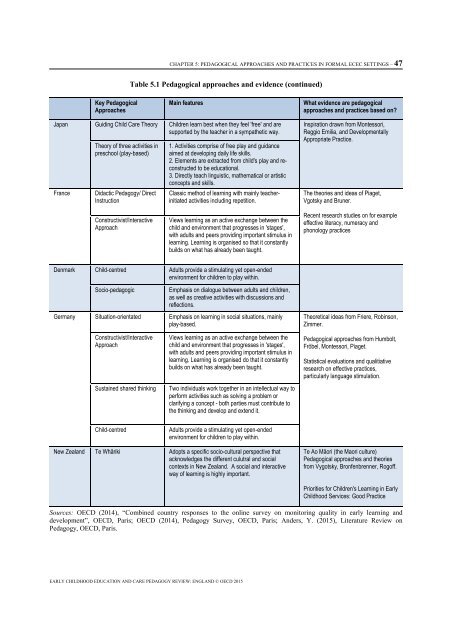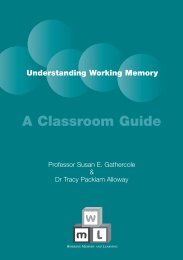early-childhood-education-and-care-pedagogy-review-england.pdf?utm_content=bufferb49b1&utm_medium=social&utm_source=twitter
early-childhood-education-and-care-pedagogy-review-england.pdf?utm_content=bufferb49b1&utm_medium=social&utm_source=twitter
early-childhood-education-and-care-pedagogy-review-england.pdf?utm_content=bufferb49b1&utm_medium=social&utm_source=twitter
Create successful ePaper yourself
Turn your PDF publications into a flip-book with our unique Google optimized e-Paper software.
CHAPTER 5: PEDAGOGICAL APPROACHES AND PRACTICES IN FORMAL ECEC SETTINGS – 47Table 5.1 Pedagogical approaches <strong>and</strong> evidence (continued)Key PedagogicalApproachesMain featuresWhat evidence are pedagogicalapproaches <strong>and</strong> practices based on?Japan Guiding Child Care Theory Children learn best when they feel 'free' <strong>and</strong> aresupported by the teacher in a sympathetic way.FranceTheory of three activities inpreschool (play-based)Didactic Pedagogy/ DirectInstruction1. Activities comprise of free play <strong>and</strong> guidanceaimed at developing daily life skills.2. Elements are extracted from child's play <strong>and</strong> reconstructedto be <strong>education</strong>al.3. Directly teach linguistic, mathematical or artisticconcepts <strong>and</strong> skills.Classic method of learning with mainly teacherinitiatedactivities including repetition.Inspiration drawn from Montessori,Reggio Emilia, <strong>and</strong> DevelopmentallyAppropriate Practice.The theories <strong>and</strong> ideas of Piaget,Vgotsky <strong>and</strong> Bruner.Constructivist/InteractiveApproachViews learning as an active exchange between thechild <strong>and</strong> environment that progresses in 'stages',with adults <strong>and</strong> peers providing important stimulus inlearning. Learning is organised so that it constantlybuilds on what has already been taught.Recent research studies on for exampleeffective literacy, numeracy <strong>and</strong>phonology practicesDenmark Child-centred Adults provide a stimulating yet open-endedenvironment for children to play within.Socio-pedagogicEmphasis on dialogue between adults <strong>and</strong> children,as well as creative activities with discussions <strong>and</strong>reflections.Germany Situation-orientated Emphasis on learning in social situations, mainlyplay-based.Theoretical ideas from Friere, Robinson,Zimmer.Constructivist/InteractiveApproachSustained shared thinkingViews learning as an active exchange between thechild <strong>and</strong> environment that progresses in 'stages',with adults <strong>and</strong> peers providing important stimulus inlearning. Learning is organised do that it constantlybuilds on what has already been taught.Two individuals work together in an intellectual way toperform activities such as solving a problem orclarifying a concept - both parties must contribute tothe thinking <strong>and</strong> develop <strong>and</strong> extend it.Pedagogical approaches from Humbolt,Fröbel, Montessori, Piaget.Statistical evaluations <strong>and</strong> qualitiativeresearch on effective practices,particularly language stimulation.Child-centredAdults provide a stimulating yet open-endedenvironment for children to play within.New Zeal<strong>and</strong> Te Whāriki Adopts a specific socio-cultural perspective thatacknowledges the different culutral <strong>and</strong> socialcontexts in New Zeal<strong>and</strong>. A social <strong>and</strong> interactiveway of learning is highly important.Te Ao Māori (the Maori culture)Pedagogical approaches <strong>and</strong> theoriesfrom Vygotsky, Bronfenbrenner, Rogoff.Priorities for Children's Learning in EarlyChildhood Services: Good PracticeSources: OECD (2014), “Combined country responses to the online survey on monitoring quality in <strong>early</strong> learning <strong>and</strong>development”, OECD, Paris; OECD (2014), Pedagogy Survey, OECD, Paris; Anders, Y. (2015), Literature Review onPedagogy, OECD, Paris.EARLY CHILDHOOD EDUCATION AND CARE PEDAGOGY REVIEW: ENGLAND © OECD 2015



